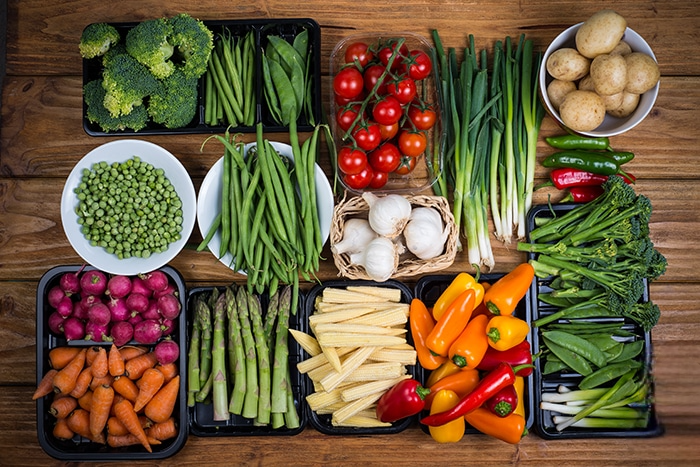This report provides a comprehensive, multi-dimensional analysis serving as a Guide to a Healthy Plant-Based Diet. Using the lenses of nutritional science, ethical advocacy, environmental impact, practical application, and cultural observation, we explore the essential pillars for successful long-term adherence. Key findings confirm that the diet is nutritionally superior when strategically planned, is the most powerful ethical and environmental food choice, and is easily maintained through practical batch cooking and knowledge.
This analysis synthesizes these perspectives to deliver a holistic framework that guarantees health, sustainability, and vitality on the plant-based journey.
Nutritional Crossroads
Adopting a plant-based diet places the individual at a profound “Nutritional Crossroads.” The key to long-term health is not just eliminating animal products, but strategically replacing them with nutrient-dense plant foods.
The core nutritional challenge involves ensuring the consistent intake of five critical nutrients often concentrated in animal products: Vitamin B12, Iron, Calcium, Zinc, and Omega-3 fatty acids (DHA/EPA).
This guide emphasizes basing the diet on whole foods (legumes, vegetables, grains, nuts, and seeds) while prioritizing supplementation (B12) and strategic food pairing (Iron and Vitamin C) to create a robust and complete nutrient profile.
LENS 1: Nutritional Analysis
The Nutritionist’s View: Building a Nutrient-Complete Foundation
For the nutritionist, a healthy plant-based diet must be deliberate and diversified to maximize phytochemicals and ensure adequate micronutrient intake. The focus is on the power of whole foods.
Core Pillar 1: The B12 and D Guarantee
“The single most crucial advice is the guaranteed intake of Vitamin B12, either via a reliable supplement or through consistent consumption of fortified foods,” asserts Dr. Sarah Chen, a Registered Dietitian specializing in plant-based nutrition. “Similarly, Vitamin D intake (via supplements, fortified milks, or sun exposure) must be proactively managed, especially in winter.”
Core Pillar 2: Strategic Iron and Calcium
The RD advises pairing iron-rich foods (lentils, black beans, tofu) with Vitamin C-rich sources (bell peppers, citrus, tomatoes) to enhance absorption. For calcium, rely on fortified plant milks, tofu set with calcium sulfate, and dark leafy greens (like kale and bok choy).
Core Pillar 3: Essential Fats
Include daily sources of ALA Omega-3s (flaxseeds, chia seeds, walnuts) and consider an algal DHA/EPA supplement for optimal brain and heart health.
Common Misconceptions vs. Reality:
- Misconception: Plant protein is incomplete.
- Reality: By eating a variety of plant proteins (legumes, grains, nuts) over the course of a day, the body easily obtains all nine essential amino acids.
LENS 2: Ethical Framework
The Ethical Advocate’s Stance: Compassion as a Daily Practice
The ethical advocate views the plant-based diet as the most direct and effective means of reducing animal suffering. The comprehensive guide serves to solidify this commitment through consistent, conscious consumerism.
Ethical Imperative 1: Aligning Values with Action
The diet is a powerful ethical vote against factory farming, which causes immense animal suffering and ecological harm. The guide promotes choosing easily accessible alternatives to replace high-demand animal products (dairy, beef).
Ethical Imperative 2: Global Sourcing Integrity
Ethical commitment extends beyond animal welfare to human welfare and environmental justice. The guide encourages sourcing global staples like coffee, cocoa, and nuts with Fair Trade certifications to ensure the supply chain is free from labor exploitation and habitat destruction (e.g., sustainable palm oil or palm-free alternatives).
LENS 3: Environmental Impact
The Environmental Scientist’s Analysis: The Lowest Footprint Diet
The environmental scientist confirms that shifting to a plant-based diet is the single most impactful consumer action for mitigating climate change, land use, and freshwater pollution.
Environmental Benefit 1: Massive Resource Reduction
The guide highlights the replacement of animal products with legumes, grains, and vegetables, which require significantly less land, energy, and water. Producing plant protein (like lentils) generates a fraction of the greenhouse gas emissions and uses less water than producing beef or dairy protein.
Environmental Benefit 2: The Role of Legumes
The guide champions the use of nitrogen-fixing legumes (beans, lentils) which naturally enrich soil fertility, reducing the need for synthetic, polluting fertilizers. This promotes sustainable and restorative agriculture.
LENS 4: Practical Application
The Everyday Practitioner’s Experience: Simplifying and Sustaining the Diet
For the everyday practitioner, the challenge is minimizing time and complexity. A successful guide must provide simple, repeatable strategies to make the diet effortless.
Practical Tip 1: The “Building Blocks” Method
Simplify weeknight cooking by batch-prepping versatile components: one Grain (quinoa/rice), one Protein (lentils/beans/tofu), and one Vegetable (roasted sweet potatoes). These blocks are assembled quickly into bowls, tacos, or wraps for the entire week.
Practical Tip 2: The Pantry Audit
Stock a “Speed Pantry” with essential, time-saving ingredients: canned beans, frozen vegetables, nutritional yeast, quick-cook pasta, and high-quality jarred sauces. This ensures a nutritious meal is always less than 30 minutes away, preventing reliance on unhealthy takeout.
Practical Tip 3: Master the Simple Swap
Eliminate decision fatigue by memorizing the most effective swaps: Oat/Soy Milk for dairy, and Cashew Cream for heavy cream/cheese.
LENS 5: Cultural Significance
The Cultural Observer’s Perspective: The Movement of Conscious Wellness
The plant-based diet is a powerful cultural movement that redefines health as a proactive, ethical choice, moving away from passive consumption driven by advertising.
Cultural Shift 1: Focus on Abundance
The guide encourages framing the diet as one of culinary abundance, promoting the exploration of new ingredients (global spices, ancient grains, diverse legumes) found in plant-based cuisines worldwide, rather than focusing on restriction.
Cultural Shift 2: Community and Support
Success is often tied to social context. The guide advises leveraging online communities and local groups for recipes, tips, and emotional support, transforming the diet from an isolated personal choice into a shared, celebratory lifestyle.
PERSPECTIVE INTERSECTION MATRIX
- Nutrition (LENS 1) cap Practical Application (LENS 4): The nutritional requirement for diversity and Iron-C pairing (LENS 1) is easily implemented through the practical “Building Blocks” method (LENS 4).
- Ethics (LENS 2) cap Environmental Impact (LENS 3): The ethical choice of whole-food proteins (LENS 2) aligns perfectly with the environmental benefit of consuming nitrogen-fixing, low-water legumes (LENS 3).
- Cultural Significance (LENS 5) cap Environmental Impact (LENS 3): The cultural trend toward low-waste living (LENS 5) supports the environmental goal of minimizing packaging and food spoilage (LENS 3).
- Synthesis: A healthy plant-based diet is a strategic lifestyle choice that maximizes personal well-being while fulfilling global ethical and environmental imperatives.
MISCONCEPTION ANALYSIS
| Misconception | Reality |
| “It’s hard to get protein and calcium.” | Plant protein is abundant in legumes and grains. Calcium is easily obtained from fortified milks/tofu and greens. Strategic planning ensures sufficiency. |
| “The diet is expensive.” | The core staples (beans, rice, lentils, seasonal vegetables) are the cheapest foods available. The diet is only expensive if relying on specialty processed alternatives. |
| “It requires constant cooking and effort.” | The “Building Blocks” method allows for batch cooking on weekends, making daily assembly time minimal (under 10 minutes). |
| “B12 is found naturally in plants.” | No. B12 must be supplemented or consumed via fortified foods. This is the single non-negotiable step for long-term health. |
KEY TURNING POINTS
- Mandatory B12 Education: The widespread dissemination of B12 necessity through expert channels has become the foundation of healthy plant-based eating.
- Meal Prep Normalization: The rise of batch cooking simplified the practical application of vegan diets for busy lifestyles.
- High-Quality Alternatives: The commercial availability of simple, great-tasting alternatives (oat milk, plant-based butter, tofu) reduced the culinary barrier.
SYNTHESIS & RECOMMENDATIONS
A healthy plant-based diet is the most powerful choice for personal health and planetary well-being, but its success relies on strategy and knowledge.
Convergent Reflections: The need for nutritional completeness (Nutrition) is met by highly efficient, ethical resources (Ethics/Environmental). This is made seamless by practical planning (Practical), ensuring long-term success that aligns with cultural values (Cultural).
Recommendations (The Comprehensive 5-Step Guide):
- Prioritize B12: Start a reliable Vitamin B12 supplement immediately.
- Master Batch Cooking: Implement the “Building Blocks” method: cook one grain, one legume, and one vegetable on your prep day.
- Ensure Iron Synergy: Consistently pair iron sources with Vitamin C (e.g., black beans with lime juice, spinach with bell peppers).
- Stock Healthy Fats: Keep flaxseeds, chia seeds, and walnuts on hand and consume them daily for essential Omega-3s.
- Seek Diversity: Use your meal plan to ensure you rotate your protein and vegetable sources to guarantee a wide spectrum of micronutrients.
FURTHER AREAS OF EXPLORATION
- A detailed 7-day starter menu using the “Building Blocks” strategy.
- The best plant-based sources for Iodine and Zinc.
- Tips for successfully managing social situations and dining out on a plant-based diet.
- The long-term health benefits of high-fiber intake on cardiovascular health.












